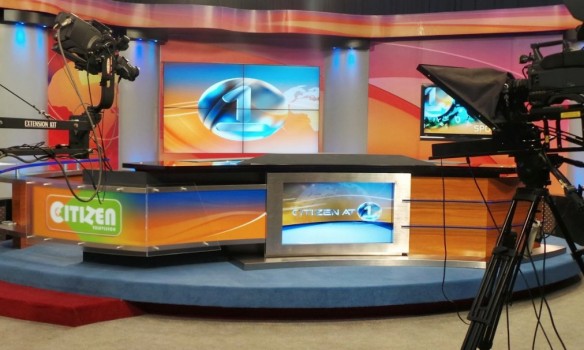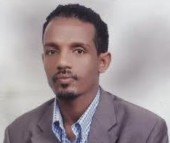Qua Vadis Kenya?
by Chalachew Tadesse / February 20, 2018 / No comments

Citizen TV and other major media outlets were shut down hours before Odinga’s controversial inauguration.
A prolonged political crisis and deteriorating security prompted by the invalidated August 8th, 2017 presidential poll is still afflicting the Kenyan body politic. Fears that the country is creeping toward authoritarianism have gotten traction more than ever before. Three recent controversial developments are worth mentioning: the controversial inauguration of the opposition coalition chief as “People’s President”, the outlawing of the opposition coalition and the forcible shutdown of four private TV channels.
After Raila Odinga of the National Super Alliance (NASA) pulled out from the October 26, 2017 repeat presidential poll, dismissing it as “shambolic,” the incumbent President Uhuru Kenyatta of the ruling Jubilee Party won in a landslide victory. Unlike the August poll the Supreme Court also upheld his victory. Regardless, Odinga’s party refused to recognize the legitimacy of Kenyatta’s presidency insisting that Odinga won the rigged August 8 poll. In a show of defiance NASA was then transformed to the National Resistance Movement (NRM), an organization implementing a series of civil disobedience actions in an attempt to force the president step aside. None of them has brought about a change of heart on the part of the Jubilee government, though. On the contrary the political impasse has deepened.
During Raila Odinga’s swearing-in ceremony on 30st January the Jubilee government took two unexpected draconian measures.

- This column’s topics will include literature, art, education, history, and political culture in Ethiopia, as well as society and politics in the Horn of Africa. Moreover, I will address the tribulations of journalists and the ill-fated constitutional right of freedom of expression under Ethiopia’s deceptive authoritarian regime. I will try to be the voice of the voiceless, be it persecuted journalists at home or exiled journalists abroad. These themes will make Ethiopia’s uniqueness and absurdities evident.

- Chalachew Tadesse is an Ethiopian journalist and columnist. He has previously worked as a full time journalist for The Reporter and The Sub-Saharan Informer English newspapers. He was also a columnist for the much-acclaimed Fact magazine, before the Ethiopian regime closed it in October 2014. A political science student by training, he works as a university lecturer and is known for his sociopolitical commentaries on the Ethiopian private press.
Unprecedented media censorship
Hours before Odinga’s controversial “presidential” inauguration, the country’s Communication Authority switched off the three leading private TV channels- NTV, KTN News and Citizen TV and Radio, along with the smaller Inooro TV. Free-to-air signals were cut shortly after the stations began broadcasting the event. No matter how unconvincing, the government’s justification is that media complicity with the event would have potentially caused violence and bloodshed across the country.
A day earlier, President Kenyatta secretly summoned some media house managers and senior editors. According to the Kenya Editors’ Guild, the President threatened that his government wouldn’t hesitate to shut down any media house and even revoke licenses if the media live broadcasted the purported swearing-in of Raila Odinga. When the news emerged, the vibrant media that has long been immune to that kind of censorshiptook it as an unprecedented alarm call.
No wonder that the outrageous attack on free media sent shockwaves to Kenyans and international organizations alike, regardless of tribal and political affiliations. For the majority of Kenyans the vibrant media is the strongest bulwark against the excesses of power in a country where political corruption and state impunity is pervasive. The targeted TV channels are known for their balanced and independent reporting. Undeniably, millions of ordinary Kenyans who can’t access Internet rely solely on analogue TV stations to access information.
The troubling siege on independent media outlets drew outcry and condemnation from the Kenya Editors’ Guild, international rights groups and the United Nations.
Even more worrisome, the government defied a court order to switch the stations back on. Without a doubt this new non-compliance to a court ruling further exacerbates the state of affairs with the rule of law. Besides, it signals the worsening relationship of the executive with the independent judiciary, which has been complicated since the Supreme Court’s invalidation of the August 2017 election results. The Ministry has maintained that the TV stations will remain off the air until conclusive criminal investigations are made into their potential role in subversion of the legitimate government. Sadly, most criminal police investigations in Kenya don’t get conclusive and credible outcomes.
Against this backdrop it is therefore no wonder that media owners are conspicuously silent about the shutdown. As it stands now they perhaps think that they can hardly rely on the judiciary alone. For media owners, business interests obviously override freedom of press. The fact that some journalists also slept inside newsrooms for days lest they be persecuted by the police speaks volumes about the frustrating state of affairs surrounding the independent media.
Yet the media houses haven’t given in entirely and still continue online transmissions during the ban. A week later KTN News and NTV resumed broadcasting albeit without official explanation followed by Citizen TV, the last to do so. Other stations still remain off the air. However, the damage on Kenya’s reputable freedom of information and independence of media has already been done.
It goes without saying that the unprecedented vicious state censorship will reopen the door for self-censorship. It will also have an adverse impact on how the media should cover future political issues and events perceived to be unfavorable to the regime. Isn’t it paradoxical to the criminalize media coverage of an event that was allowed by the same government? It certainly is. Apparently, the media is an honest victim of the government’s dirty cat-and-mouse political game with the opposition.
Controversy and opposition clampdown
Raila Odinga took his crusade against the Jubilee government to a whole new level when he was inaugurated as “people’s president”. As a result, Kenyans, who are divided along tribal and political lines, must therefore now grapple with the fact of having “two presidents”: the incumbent Uhuru Kenyatta and the de facto Raila Odinga.
For fanatical opposition supporters, Odinga’s mock inauguration is no symbolic move but something that supposedly bears political significance. In contrast, Jubilee Party supporters downplay it as a mere political absurdity. Or to put it sarcastically, they equate it with a political fantasy movie produced and played in wonderland by the intransigent Odinga, who they say seeks to grab state power by any means.
Within the Jubilee government circle, however, Odinga’s nerve-wrecking political game has caused much anxiety. Going against earlier warnings to thwart the swearing-in event, the police was withdrawn from the venue at the last minute. In a well-orchestrated move, the Ministry of Interior then declared the inauguration as treasonous act. Besides, the National Resistance Movement was also outlawed as an “organized criminal group,” essentially putting an end to its political or legal existence. If the ban is heeded, the punishment for political activity in the outlawed group will amount to a jail term of up to 10 years. How the matter will be played out in court will attract wider attention if lawyers challenge the ban.
Opposition politicians have been detained and later released on bail in connection with the swearing-in ceremony. A prominent pro-Odinga opposition lawyer was also deported to Canada accused of facilitating Odinga’s inauguration while holding a foreign citizenship. To the regime’s dismay however a court ruled in his favor. A growing fear of a massive witch-hunt against opposition politicians and members is looming. Moves such as this effectively close the door for dialogue. So far, no attempt has been made to arrest Raila Odinga, who is widely seen as untouchable, or his main co-principals. Seemingly, most Kenyans share the view that arresting Odinga will put the country on the brink of unprecedented bloodshed.
A few days after inauguration, Odinga called for new elections in the coming August, further complicating the crisis.
With their contrasting personalities and visions, the two arch-rivals Uhuru Kenyatta and Raila Odinga have literally held Kenya hostage. Divisive rhetoric and political polarization along tribal lines is widening. But calls by the US, EU and AU for President Kenyatta, who is in his second and last term in office, to initiate dialogue with the opposition chief have fallen on a deaf ear.
In a recent editorial, the country’s leading newspaper Daily Nation penned a candid warning: “Tension is building up and it is just but a matter of time before it explodes.” Kenya is certainly entering into a dangerous political trajectory.
It is therefore high time that leadership prudence be taken as an indispensable key to work out ingenious ways to change the untenable status quo for the better. Odinga or not, the fight for the long overdue electoral justice, the alienation along perceived or real tribal linesand allegations of police impunity can’t simply fade away from the political landscape. Human Rights Watch says Kenya’s human rights record since 2013 is in a “slippery slope.” The Kenyan National Commission on Human Rights confirmed the death of at least 92 people under the hands of the police in the August and October 2017 elections alone.
Against this backdrop many observers today ask: Qua vadis Kenya? Are the recent frustrating developments small hiccups for Kenya’s democracy? Or do they mark the country’s Orwellian turn, as The New York Times recently put it? But an Orwellian turn is an overstatement, because Kenya is undeniably still a beacon of democracy in the volatile Horn of Africa region no matter the clouds of uncertainties. Tribal and political divisions aside, the majority of Kenyans also share the optimism that the hard-won flame of democracy can’t be easily extinguished.




